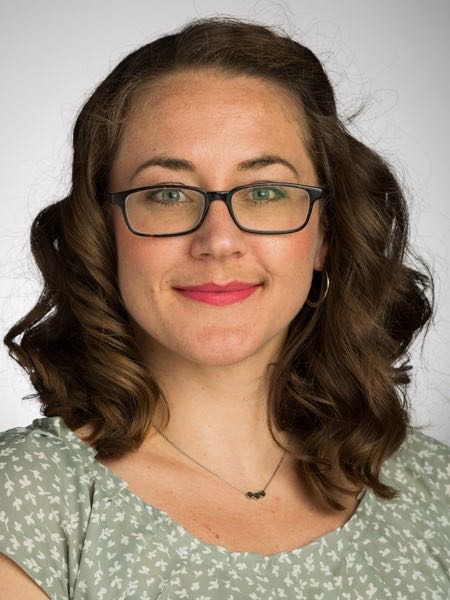
Fredericks | Courtesy
Hillsdale College welcomed new Assistant Professor of English Elizabeth Fredericks to the English department faculty this fall.
Originally from southern California, Fredericks earned her bachelor’s degree in English from Hope College in Michigan. She continued her education in seminary at Regent College in Vancouver, British Columbia. Fredericks earned her master’s degree in 20th century British and Irish Literature at Durham College in England, and completed her Ph.D. at Baylor University in Texas. After teaching at Valparaiso College in Indiana, Fredericks made Hillsdale home.
This semester Fredericks is teaching English 340, along with two sections of Great Books II.
“People told me that there was not a strong 20th century British presence and really not necessarily a strong 20th century Irish one either,” Fredericks said. “And so that is definitely something I want to bring, and so I told my 340 students that I love the Victorians; I think they are so fascinating, but the 20th century is my home. Someone else might teach this and root it strongly in the Victorians and then look forward. I am grounding us in the Victorians and then looking to see, ‘Where do we go?’ The 20th century has the stronger grip on me. I love it. It’s my playground.”
Fredericks is particularly interested in the way literature provides a window into other cultures and times, and she hopes to share that enthusiasm through her classes.
“I love the side of food and culture, that all of our texts aren’t just the book on the desk in front of us, but they came from particular times and places and so finding windows into those is exciting,” Fredericks said.
Fredericks will bring her own flair to the Great Books classes as well, particularly through her book list.
“One thing I wanted to do was to just kind of organically incorporate women’s voices, because Great Books I has so few. When we get later in Great Books II, there’s an explosion of women writing, and so I wanted to reflect that in large and small ways.”
One of Fredericks’ 105 students, sophomore Parker Thayer, commented on her interesting book list and exciting teaching style.
“Dr. Fredericks seems like she will be a great professor; she’s extremely enthusiastic and energetic,” Thayer said. “One of the hallmarks of her teaching style seems to be inviting student response rather than lecturing. If nobody is brave enough to answer a question, she will wait you out instead of providing an easy way out.”
Aside from giving some cultural context to illuminate the texts, Fredericks structures her classes mostly around vibrant discussion, allowing students to guide their own study of the texts based on what they found intriguing.
“I like for the students to be talking to each other and working through things without me going, ‘And this is the answer,’” Fredericks said. “So I like to be more hands off and just nudge the conversation in different directions according to what I want people to come away with and also to create space for them to raise what they are interested in.”
While this style of teaching can make it more difficult to keep discussions on topic Frederick enjoys the challenge.
“One thing I like about teaching is the surprises,” Fredericks said. “And for the students to feel like it’s their moment, and not one that I constructed for them, I think makes it a lot more interesting for them as well. The classes I was always the most excited by were definitely the ones that didn’t feel canned, and that had these moments of sort of electric surprise.”
Sophomore Katie Ryerson expressed her delight in Fredericks’ Great Books II class.
“I love it. She has a lot of energy. She’s excited about what she’s teaching, and she really wants us to look closer at the text and draw our own conclusions,” Ryerson said.
Because discussion-based classes rely so much on student participation, Fredericks has been pleased to find Hillsdale’s student body so eager to join in conversation.
“There’s only seven people in [Victorian and Modern British Literature], and still the time just flies by. They aren’t shy,” Fredericks said.
Going from Valparaiso to Hillsdale has meant making some adjustments for Fredericks.
“Hillsdale is the smallest school I’ve ever taught at, and it’s the smallest town I’ve ever lived in,” she said. “I sort of just picked up and started over in a new place. It helps that I have a dog.”
Fredericks’ terrier mix, Charlotte, has been with her since she was studying for her Ph.D. in Texas.
“Chuck” has aided Fredericks not only in adjusting to the move, but also in incentivizing students to come to office hours.
“I did outdoor office hours last Friday. We sat on a bench outside of Lane. I told my students, you can come by and ask a question, or you can not bother with the question and just pet the dog,” she said.
Fredericks is easing into classes, enjoying getting familiar with the campus and the student body.
“Everyone told me coming in that the first year is the hardest, so make it as easy on yourself as you can. Pick texts you know, that you love, and get adventurous later. That’s the advice I’ve been given, and it sounded very sensible at the time, and in the middle of week three it feels very sensible too.”

